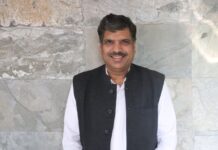Mixed ability classrooms need to be included in all educational institutions– V K Gautam, Additional Chief Secretary, MSHRC
M.A. Sayeed, Acting Chairperson, MSHRC; V K Gautam, Additional Chief Secretary, MSHRC; Dr. Prakriti Poddar, Managing Trustee, Poddar Foundation advocates the need to devise better strategies to address the rising mental health burden
Mumbai, December 12, 2019: As we observe the World Human Rights Day, human rights advocates and mental health experts and council generals joined hands today to give out a loud call for greater recognition of human rights of people with mental illnesses in India while advocating the need to devise multi-pronged strategies to support mental wellness for 1.3 billion Indians.
Shri Bhagat Singh Koshyari, Governor of Maharashtra sent a message about the importance of human rights for today’s generation. Mr. M.A. Sayeed, Acting Chairperson, MSHRC also expressed that “call for the youth to stand up for the human rights as constructive instrument for change”. The conference session of ‘Human Rights for Mental Health’ was organized by the Poddar Foundation in collaboration with Maharashtra State Human Rights Commission. The conference saw various stakeholders coming together to discuss the pertinent subject and offer different perspectives into the current standards of human rights for the mentally ill in India.
World Health Organization states that the world is facing a global human rights emergency in mental health with people with mental disabilities experiencing a wide range of human rights violations. In 2016, the UN Human Rights Council (UNHRC) issued a resolution calling for the recognition of the rights of people with a broad spectrum of mental illness, from depression and alcoholism to schizophrenia and bipolar disorder.
Attendees said with a growing burden of mental illness, there is an urgent need to de-stigmatize the solutions and convert them into ‘Acts’ for mandatory application. The discussion centered around the gaps in ensuring human rights for mental health and how to build upon International standards for future adoption in India.
“The third pillar of governance need to come forward and take charge of the mental health policies for the administrative wing. The more we discuss and more opportunity we provide to spread open discussion, the more we serve the cause of mental health issues,” said, Shri. Vijay Kumar Gautam, Principal Secretary, Maharashtra State Human Rights Commission.
“The burden of mental health is increasing not just in India but across the world. It is imperative therefore to take necessary measures to improve accessibility of care for people with mental illnesses. In the developing world particularly, there remains a shortage of mental health experts to met the rising burden of disease. We not only need to have more mental health experts, psychiatrists, psychologists, therapists etc but also generate enough discussion and awareness so as to de-stigmatize the subject,” said Ms. Annie Dube’, Consul General of Canada in Mumbai.
“I think it’s fabulous that the Human Rights Commission is taking up the cause of Mental Health so seriously. We need to put mental health in the centre of all our conversation to protect India from falling prey to the growing epidemic. Poddar Foundation strives to build roadmaps through these conversations,” said Dr. Prakriti Poddar, Expert in Mental Health, Director Poddar Wellness Ltd, and Managing Trustee of Poddar Foundation.
“Considering we are talking of a mental health epidemic in our country, it necessary for all of us to ensure that people with psychiatric disorders are treated as soon as possible by mental health workers, and discrimination related to work, insurance, marriage and socialization should be reduced to the utmost. It is only then that India will be considered to be a powerful nation,” said, Dr. Kersi Chavda, Consultant Psychiatry, Hinduja National Hospital, Mumbai
Other speakers included Mr. M.A. Sayeed, Acting Chairperson, MSHRC; Shri Sanjay Macwan, Vice President Partnership, IJM South Asia; Professor Rashim Oza, Mumbai University; Brijesh Kumar Singh (IPS), IGP Maharashtra Cyber and Dr KM Parivelan, Tata Institute of Social Sciences, among others.
In India, 1 in 4 people deal with some form of mental illness in their lifetime. With mental health treatment extremely expensive, there have been recurrent demands for it to be included in Health Insurance plans. With the passing of the Mental Healthcare Act (MHCA), 2017, this has changed for good. Specifically, in line with this Act, the Human Rights Department recognizes the need to ensure the rights of the mentally ill. However, obstacles remain to the implementation of the legislation in letter and spirit there is hope that things will change.
The conference also sought to improve awareness among various stakeholders who are in daily contact with people with mental disabilities, the lawyers, magistrates and judges who make important decisions concerning the lives of people with mental disabilities. The conference also underlined the need for giving due attention to mental health and wellness of people working in high-stress roles such as the Armed Forces and the Police Forces.
Corporate Comm India(CCI Newswire)
























